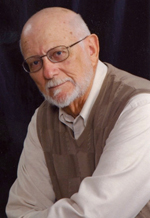 Recently I went to the January NEOBA meeting (Northeastern Oklahoma Beekeepers Association) to hear a presentation by Dr. Harrington Wells, of the University of Tulsa, speaking on experiments he has been doing involving honeybees. The first speaker was a young man with a great deal of good experience raising bees - and a member of the club. He gave us really good advice, which made us think of what I was doing and maybe I would be lucky that my bees have not frozen out. As an aside, I do not see how they can survive as the temperature has gone down, down down and bees are not cold weather creatures.
Recently I went to the January NEOBA meeting (Northeastern Oklahoma Beekeepers Association) to hear a presentation by Dr. Harrington Wells, of the University of Tulsa, speaking on experiments he has been doing involving honeybees. The first speaker was a young man with a great deal of good experience raising bees - and a member of the club. He gave us really good advice, which made us think of what I was doing and maybe I would be lucky that my bees have not frozen out. As an aside, I do not see how they can survive as the temperature has gone down, down down and bees are not cold weather creatures.
Dr. Wells has worked with several local and regional universities with this experiment on the amount and kinds of toxins that are absorbed into the hives. I must interject that my alma mater (University of Central Oklahoma) was involved with this experiment and helped with the grant. He spoke for over 45 minutes and it was absolutely amazing to me as to the level of attention to this man. He did not “water down" the information he presented and used all the scientific names for the toxins and processes and treated us as if we were adults who wanted to hear what he had to say. In many meetings of some groups I have belonged to, that is not always the case. Also, the members of NEOBA are as varied and diverse as a group could possibly be.
Dr. Wells went through the history of toxins people have used to kill and control insects so we could have enough food to feed everybody. As you know, for every action there is a reaction and the reaction is not always good for people. One frightening thing thing that I had forgotten was that DDT never goes away. Never. All the DDT that I (and most of you older folks) have absorbed is still there.
He thinks, in MY words, that he has a viable theory as to the cause of colony collapse which is decimating the world's honey bees. By taking us through the use of chemicals, both natural and manufactured, it made it so much easier to understand.
For this old guy, I really believe he is on to something and hope that he gets his study published and called to the attention to politicians who are afraid of the chemical companies. Since he is from a small, private university, it will be harder for him to get the notoriety and attention of the nation's and world press. Seemingly, in the opinion of about 150 beekeepers who were there, he deserves to be heard.
Then on the way home, which is about a 20 minute drive, my brain was already tired from listening to a very intelligent man deliver a very intelligent talk so I turned on the radio to sooth my brain. That didn't happen.
The dial was set on an NPR station and the show was a very serious discussion about a very serious topic. After only a few minutes I gave up and switched over to my classical station. That didn't work either as the classical station D J was having a mini-seminar on J.S. Bach as compared to the Italian composer, Vivaldi.
The DJ put on a recording of Pablo Casals during a rehearsal. Casals is considered by many as the world's greatest cellist. He is also a sought after conductor and, to my great surprise, he seemed to lead rehearsals as I did. Only the difference is he is great and I was just me.
His style reminded me of back when I was a real life person and was trying to get points across to a performing group. Casals would not let this on, seemingly minor, point pass as the orchestra was not giving him the way he felt Bach should be interpreted. He would sing the notes, using la la la on pitch and length, emphasizing notes and shortening and lengthening notes as they should be. It was amazing what a teeny fraction of volume and length could make in the music when the orchestra played what he wanted. It just proved what a master he is.
It made me long for the days when I would have to explain these tiny things to a roomful of teenagers and most of them wanted to learn. They produced some marvelous music because they wanted to learn. This is not meant to be a brag for me, but I believe the reason the bands were able to perform to such a high degree was because they knew I believed in them.
But by the time I got home my brain was so tired I turned on the TV and watched Big Bang Theory.
Too much knowledge
- Details
- Written by Chelsea Cook















